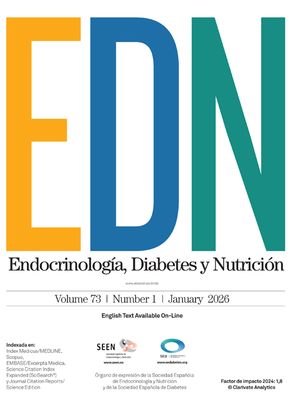Like our colleagues on the editorial board of the journal Avances en Diabetología,1 we also appreciate the interest shown by Relimpio et al. in the journal of the Spanish Society of Endocrinology and Nutrition (SEEN). The letter received from these authors, however, caused us considerable surprise, because Endocrinología y Nutrición has been publishing monographs funded by pharmaceutical companies for many years. We do not know whether the authors of the letter ignored this fact until the monograph alluded to happen to be published2 or whether they simply decided that it was this monograph specifically which merited the sending of the text, to which this is the response. It is also possible that their perceptions regarding this type of publication have recently changed and that until this monograph was published they had never experienced the unpleasant sensation they report in their letter. It is far from our intention to cause the readers of this journal to suffer adverse effects because of the contents of such supplements. While some of the terms used by the authors may be considered inappropriate, we are sure they did not have any intention of giving offence with their words. Having said this, we will try and introduce some elements of reflection regarding the contents of their letter.
First of all, the publication of monographs related to drugs is common practice in many national and international publications. Whether or not this is a good practice cannot be decided by the editorial board of the journal of a scientific society. It is the Spanish Society of Endocrinology and Nutrition, through its managing board, which periodically negotiates with the publishing company the contract including the possibility of publishing supplements of any type. In any case, the editorial board of the journal is responsible for following the scientific editorial procedures required for this type of publication, the essence of which was described by Conget et al. in the reply they sent to a letter by the same authors,1,3 The editors are also responsible for ensuring transparency, so that any reader may identify any conflicts of interest.
The authors have apparently disregarded the advice by Conget et al. to discuss each of the questions they raise in the appropriate forum. The authors are again recommended to address each question to whom it may concern. To propose the removal of monographs sponsored by pharmaceutical companies published as supplements to the journal Endocrinología y Nutriciónthey should have addressed their objections to the managing board of the SEEN and, ideally, they should also have expressed their opinion at the assembly of the Society, which is the most suitable place for this debate. It can be clearly inferred from the text that the authors are making this proposal in the setting of a wider proposal contemplating the renunciation of the Society of any direct sponsoring of any scientific society by the pharmaceutical companies.
Relimpio et al. insist in their manuscript on the aspects discussed in their previous publication,3 and again provide data concerning pharmaceutical costs in our country. We have nothing to add to these data, nor can we answer the questions of the authors regarding drug prescription. We think that such questions should not be posed to the editor of this journal. It is the governments that decide budget provisions, and how the expenses under the different headings are controlled. The signatories should rather address themselves, through the channels they deem most appropriate, to the authorities responsible for health planning and policy at autonomous and national level, and ultimately address the European Medicines Agency, which authorizes the clinical use of drugs. In fact, the authors could have extended their complaint, starting from the publication of the abovementioned supplement, and ultimately questioning the system governing the economy worldwide. In this context, they could question the convenience of drug research, production, and marketing being in the hands of private industry. They could even question the fact that a considerable number of scientific publications are controlled by multinational companies. These are substantive issues; all of them are controversial and debatable. However, this controversy is also out of place here, in our view. The undersigned want to expressly state that we are convinced that, as professionals and citizens, we should defend a good risk/benefit balance and an optimum cost/effectiveness ratio when using the drugs available to us.
For the time being, we will have to continue collaborating to a greater or lesser extent with pharmaceutical companies in the research and development of new treatments, complying at all times with the established regulatory framework and imposing on ourselves the maximum transparency as professionals. We take the opportunity provided by this manuscript to ask all authors who submit papers to our journal to always state any potential conflicts of interest related to the contents of manuscripts. These statements can never say too much, and often say too little. It is not uncommon for authors to state that they have no conflicts of interest when such a statement is not in fact the case.
Conflicts of interestDídac Mauricio has participated in research projects funded by, or has received fees for lectures and participation in consultancy work, from Abbott, AstraZeneca, Bristol Myers Squibb, GlaxoSmithKline, Lilly, Merck Sharp Dohme, Novartis, and Novonordisk. Albert Lecube has participated in research projects funded by, or has received fees for lectures and participation in consultancy work, from Ipsen, Lilly, Merck Sharp Dohme, and Novonordisk. Irene Halperin has participated in research projects funded by, or has received fees for lectures and participation in consultancy work, from Amgen, Genzyme, Ipsen, Lilly, Novartis, and Pfizer. José Manuel Gómez has participated in research projects funded by, or has received fees for lectures and participation in consultancy work, from Amgen, AstraZeneca, Genzyme, Ipsen, Lilly, Novartis, and Pfizer.
Please cite this article as: Mauricio D, Lecube A, Halperin I, Gómez-Sáez JM. Carta respuesta. Endocrinol Nutr. 2013;60:410–411.




